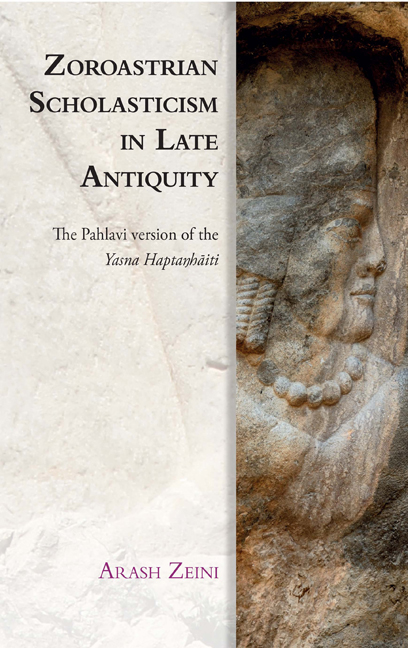Book contents
- Frontmatter
- Contents
- List of Figures
- List of Tables
- Acknowledgements
- Series Editor’s Preface
- Preface
- Conventions
- Abbreviations
- Dedication
- Part I Introduction
- 1 Introduction
- 2 The Zand
- 3 Scholasticism
- 4 Fire in Zoroastrianism
- 5 Precis: Yasn Ī Haft Hād
- Part II Text and translation
- 6 PY 35
- 7 PY 36
- 8 PY 37
- 9 PY 38
- 10 PY 39
- 11 PY 40
- 12 PY 41
- Part III Miscellaneous Observations
- 13 PY
- 14 PY 36
- 15 PY 37
- 16 PY 38
- 17 PY 39
- 18 PY 40
- 19 PY 41
- Part IV Epilogue
- 20 Reflections on the Zand
- Appendices
- Appendix A Transliteration and Apparatus
- Appendix B Y 9.1
- Appendix C Fire in the Older Avesta
- Appendix D Iϑā
- Appendix E MSS Concordance
- Bibliography
- Index of Passages Quoted
19 - PY 41
Published online by Cambridge University Press: 14 October 2020
- Frontmatter
- Contents
- List of Figures
- List of Tables
- Acknowledgements
- Series Editor’s Preface
- Preface
- Conventions
- Abbreviations
- Dedication
- Part I Introduction
- 1 Introduction
- 2 The Zand
- 3 Scholasticism
- 4 Fire in Zoroastrianism
- 5 Precis: Yasn Ī Haft Hād
- Part II Text and translation
- 6 PY 35
- 7 PY 36
- 8 PY 37
- 9 PY 38
- 10 PY 39
- 11 PY 40
- 12 PY 41
- Part III Miscellaneous Observations
- 13 PY
- 14 PY 36
- 15 PY 37
- 16 PY 38
- 17 PY 39
- 18 PY 40
- 19 PY 41
- Part IV Epilogue
- 20 Reflections on the Zand
- Appendices
- Appendix A Transliteration and Apparatus
- Appendix B Y 9.1
- Appendix C Fire in the Older Avesta
- Appendix D Iϑā
- Appendix E MSS Concordance
- Bibliography
- Index of Passages Quoted
Summary
PY 41.2
Mehendale (1996) criticises Narten's (1986: 47) translation of this stanza. In his view nā vā nāirī vā ‘ men and women’ is used as a collective denoting humans who wish that Ahura Mazdā establishes a good rule over themselves (Mehendale 1996: 173). To counter Narten's translation of this passage, Mehendale adduces seven points, suggesting that nā vā nāirī vā cannot refer to a good ruler, be it a man or a woman. Mehendale (1996: 174) also disagrees with the translations provided by Humbach (1991) and Kellens and Pirart (1988). Although he does not discuss the Zand, Mehendale's observations deserve a brief mention, as they agree with the priestly interpretation of this stanza.
In contrast to Narten (1986: 264, fn. 46), who interprets tū as a particle and not as an enclitic pers. pronoun, Mehendale and the exegetes posit a 2sg.pers.pron. In PY 41.2, tū is rendered tō, most likely referring back to Ohrmazd: ān ī ohrmazd tō. Like Mehendale (1996: 174), the exegetes realise that the 2sg.opt.mid. xšaētā ‘ may rule’ disagrees with a 3sg.pers.pron. tū. While Mehendale does not propose a viable solution, the Zand elegantly solves the problem by constructing a sg. causative denominative verb pādixšāyēnēd, preceded by an enclitic pronoun ā-t: ‘he/she causes you, (O Ohrmazd), to rule’.
In Mehendale's translation nā vā nāirī vā seems to function as an apposition to the gen. Ipl.pers.pron. nǝ̄ ‘ us’, but the exegetes construct a subordinate relative clause introduced by kē, defining amā ‘ us’ more closely as ‘male (beings) and women’. Thus, both in Mehendale's translation and in the Zand the males and females refer to the speakers and not to a ruler. To make this point explicit, the Zand uses precise language here: ō amā kē nar ud nārīg hēm ā-t pādixšāyēnēd ‘ will make you rule over us, who are male (beings) and women’. It is noteworthy that in other passages of the PYH, the verb ‘to be’ is spelt, denoting a 1sg.
- Type
- Chapter
- Information
- Zoroastrian Scholasticism in Late AntiquityThe Pahlavi Version of the Yasna Haptaŋhāiti, pp. 279 - 282Publisher: Edinburgh University PressPrint publication year: 2020



